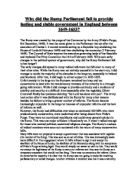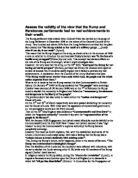When judging the Rump we must realise the aims of that body. It was made up of the established ruling elite, many of which had returned to rule from Charles’ Long Parliament. Many members were unnerved by the situation they faced and clung to Rump to return the status quo. The Rump’s main aim was to return to normality, as Lokyer puts it “the Rump was a conservative body”. This aim demonstrated itself in both action and inaction, for example as Wilkinson points out although a Council of Trade was established in August 1650 to aid mercantile interest no focus was taken at all over the issue of tithes.
If we look at the early actions of the Rump Parliament it is true that we can see some clear progress and success. Caught up in the romanticism of the ‘revolution’ many constitutional changes were passed, for example it abolished both the Lords and Episcopacy on 6th February 1649 and the next day abolished the Monarchy. Then in September of 1650 compulsory attendance of the church was ended and English was made the language of the law. These reforms were both symbolic and practical; people now had freedom of worship and had the chance to defend themselves ably in a court of law. However after the trauma of Pride’s Purge and regicide the Rump was keen to take a conservative approach to administration. For many MPs after the execution of Charles the Rump was all they had left and they were determined to not allow the country to descend into anarchy.
This exhibited itself in approaching the remaining conservative gentry and inviting back those who were pushed out in Pride’s Purge. The Rump knew that it was the conservative local elites that ran much of day to day life within the country and so tried to win their support by supporting the status quo. This led to them cracking down on radical modernising groups such as the Levellers and Diggers. These groups presented a threat to not only Rump and Army authority but also the gentry whose support the Rump yearned for. In March 1649 the Levellers were crushed at Buford with the arrest of leading levellers including Lilliburne the Diggers soon followed and the most influential radical groups had been silenced. This was reinforced by censorship of the press and they also attempted to limit radical religious groups from gaining influence with the Adultery Act of May 1650 and Blasphemy Act of August 1650 was aimed at curbing extreme religious "enthusiasm". To stop extreme evangelicals from preaching, they formed “Committee for the Propagation of the Gospel”, which issued licenses to preach. This crushing of civilian opposition was seen as necessary for conservatives to prevent anarchy from spreading through the country, however to some in the army it was seen as coercive and backwards.
Military actions were indicative of the martial supported Rump. The Rump did achieve unification of Britain under English rule, as Kishlansky identifies a feat not completed by monarchs for hundreds of years. On top of this the Rump and Army were able to defeat Charles at Worcester on 3rd September 1651 eliminating any further Royalist threat to the Republic. However domestic military success was marred by the Anglo-Dutch war. Although victorious at the end of the war and the navy managed to take many prizes during the war (doubling the size of the English mercantile fleet) it plunged the country further into debt and alienated the army further. The cost of supplying the naval fleet proved exorbitant and during October of 1653 things came to a head, dockyards refused to take any more contracts from the admiralty until existing debts were paid off and then unpaid sailors rioted through London. Cromwell and other army officers were exasperated at seeing two Protestant nations exhausting themselves in conflict while at home their own soldiers were still not paid. Parliament used the Navy as a political tool to try and diminish the influence of the Army however it failed to do so and only angered the Army more. If we look at the Rumps military actions simply we could say it was successful as it managed to unify Britain, defeat the remaining royalist threat and overcome the Dutch however we must realise that this created a situation in which the Army saw itself as the real instrument of God’s that left it unwilling to back down on its demands and unwilling to disband.
As D.L. Smith points out this cornered positioning of the Rump manifested itself inaction and apathy. The early progress of the Rump soon began to slow and the army’s demands began to land on deaf ears. On top of many MPs feeling helpless to stop Army agendas from taking over self-interested MPs exacerbated the situation by lobbying for their personal interests in Parliament. For example professional lawyers cooperated to oppose the reformation of the English Legal System. Some of the best known lawyer allies were Bulstrode Whitelocke and Sir Thomas Widdrington, and Nicholas Lechmere and Lisliborne Long there were also members who were particularly concerned with commercial matters and politics in the city of London. Although lawyers and merchants were a minority compared to the large number of rural land lords that occupied the Rump Parliament, their interest groups’ energy and cohesiveness was able largely influence Rump politics. The Rump only ever had on average 60 to 70 regularly active MPs and the number acts passed by the Rump declined over time from 78 in 1649 to 44 in 1652.
In conclusion the Rump from the majority of peoples point of view at the time (conservative) was fairly successful, it managed to hold off the Army’s radical demands and tried to pave a middle way accepting that the times were very volatile. As Lokyer says “its pragmatic approach to problems was widely condemned at the time”. The Rump dealt with most issues it faces sensibly and thoughtfully and did manage some important social reform however this success was not important to the only people who mattered at the time. The army and Cromwell saw the Rump as self-serving and self-perpetuating and so he established the Nominated Assembly.
The Nominated Assembly was a collection of 139 MPs based on the idea of a Sanhedrin. Although an old idea Aylmer points out that it developed public administration into a much more professional civil service than had existed under Charles I. The division within the Nominated Assembly was far greater than within the Rump, there was a large number of remaining moderates however also a small number of organised radicals who as Coward argues had great effect on political discourse within the body. There were thirteen Fifth Monarchists joining around 30 or so other radicals within the bod. The Nominated Assembly was described as “a pack of weak, senseless fellows, inferior persons, of no quality or name, known only by their gifts in praying and teaching” by Edward Hyde a contemporary.
If one argues that the Rump did to little then the Nominated Assembly did too much. It sat for six days of the week and passed many acts. These included some sensible reforms such as the Act to settle Ireland, Act to link Scotland and the 1653 Civil Marriage Act. On top of this they introduced many other important social reforms such as the reform of the law on debt, more humane treatment of the insane and tougher measures on thieves and highwaymen. However there were also many alienating and radical acts passed also. Some of the radical demands that were put forward in the Nominated Assembly were codification of the law into a pocket book, abolition of the court of the chancery, abolition of tithes and abolition of a gentleman’s right to nominate men to church livings. The Fifth Monarchists also wanted to introduce the “Law of Moses” shouting at assemblies “overturning, overturning, overturning days!” On top of this toward the end of their administration radicals amongst the Nominated Assembly also hinted at cutting the pay of the army, including officers. The most controversial acts were those concerning the church and tithes which many moderates both within and outside the body saw as a vicious attack on property rights. This was the main issue for the Nominated Assembly its radical members, they alienated support from everyone around and within the institutions as their demands attacked not only moderate ideals but also most importantly influential individuals’ vested interests.
In supposition the Nominated Assembly was a failure because it attempted to commit to reformation when many within and from outside were still moderates, their attempts for reform although spirited were too much. Not only did they challenge the beliefs of social conservatives but also the vested interests of them; tithes were a particular hanging point and seen as an attack on property rights by many. The Nominated Assembly failed to get enough support from its peers for its minority aims and so failed. So disheartened were moderate contemporaries that the Nominated Assembly ended with its own moderates forcing its closure.
In conclusion although both institutions eventually failed I believe that the Rump was much more successful than the Nominated Assembly given the circumstances. The Rump managed to steer the country through a middle ground for four years whilst constantly being scrutinised by their de facto powerbase the army. However the Nominated Assembly, given every chance by Cromwell, was too ambitious and radical and threatened too many of the established elite to make any sustained impact. The Nominated Assembly lasted for a shorter time than the Rump and although its social reforms were good it was too radical for the time and was relentless in its pursuits. The Rump acted in a less amorous, more expedient fashion seeing off many threats to the nation and pursuing a more established model for the time with results steering the country away from the devastation of war. After the civil war what the nation needed most was stability not more radical reform.








